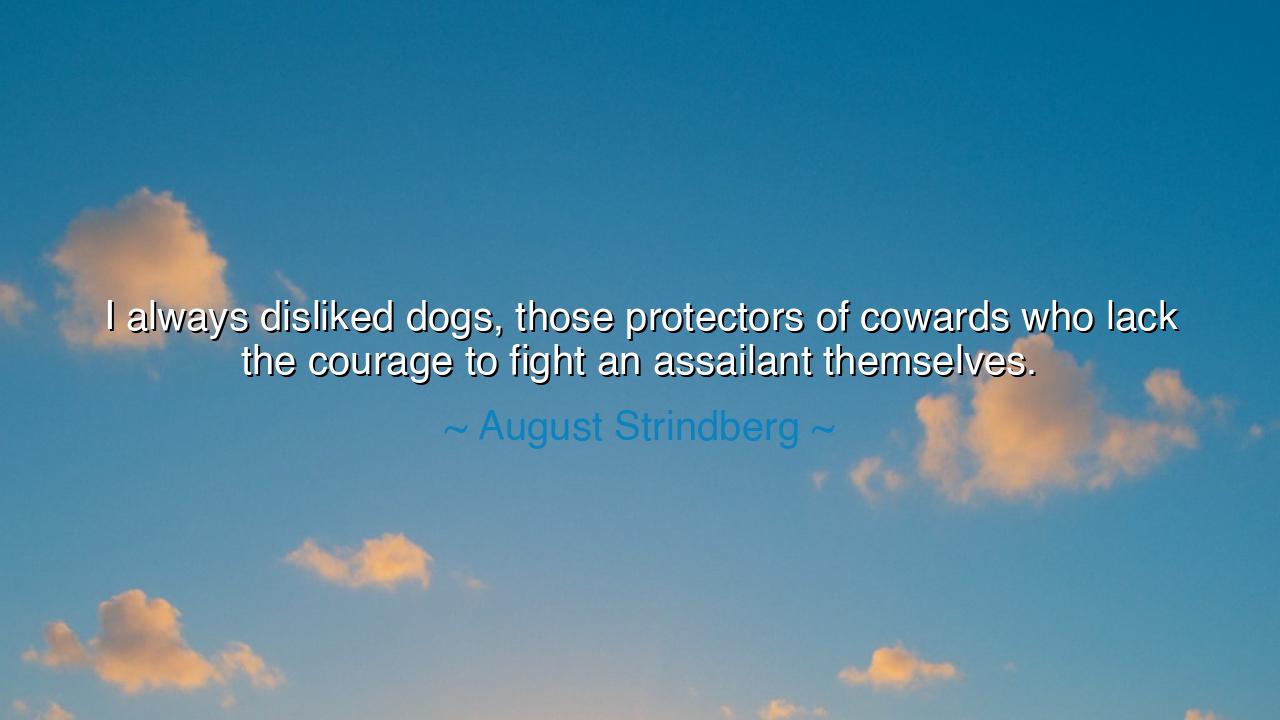
I always disliked dogs, those protectors of cowards who lack the
I always disliked dogs, those protectors of cowards who lack the courage to fight an assailant themselves.






The Swedish dramatist August Strindberg, fierce of pen and fire of spirit, once declared: “I always disliked dogs, those protectors of cowards who lack the courage to fight an assailant themselves.” Harsh though these words may seem, they strike at the marrow of a deeper truth. Strindberg was not railing against mere animals, but against what they symbolized—the tendency of men to seek protection without courage, to hide behind others, be they beasts, men, or institutions, rather than stand and face their trials with their own strength. His disdain was not for the dog, but for the cowardice that demands one.
To understand the meaning of this quote, one must first grasp Strindberg’s restless soul. He lived in the storms of his own creation—writer, philosopher, and rebel. He scorned weakness, despised hypocrisy, and believed that the truest measure of a man was his ability to stand alone against the forces that opposed him. In his eyes, to rely upon others for one’s defense, when one possesses the means of courage within, was a sin against the human spirit. Thus, his dislike of dogs becomes a parable: it is the cry of a man who demanded from himself, and from others, the valor to meet life face to face.
He speaks of those who summon protectors when they should summon their own resolve. The dog, fierce though it may be, represents a shield between the soul and the struggle that might have purified it. For what is courage, if not the decision to confront fear with one’s own heart? To hide behind another’s strength, Strindberg suggests, is to deny the divine fire that lives within us. It is better, he implies, to fall in the arena of life fighting with one’s bare hands than to live forever shielded by another’s teeth.
History has known such courage—the kind that stands unguarded in the face of danger. Recall Leonidas and his three hundred at Thermopylae, who faced the Persian horde not with fear but with fierce dignity. They sought no beasts nor shields beyond their own resolve. Each man stood as his own protector, his body and soul united in defiance of fate. Their strength came not from companions of flesh, but from inner conviction—the belief that honor and courage outweigh even life itself. Such men would have understood Strindberg’s words; they would have laughed at the notion of protection, for they knew that the true protector of man is his will.
Yet Strindberg’s statement, though fiery, is also deeply human. It reveals the eternal conflict within the soul—the tension between the desire for safety and the call to bravery. To live is to be assaulted by life itself: by hardship, by betrayal, by loss. And in those moments, many seek the comfort of guardians—people, wealth, or systems—to shield them. But the wise know that such shields are illusions. The storms of fate cannot be fought by proxy. They must be met with the naked self, with one’s own courage, one’s own faith, one’s own endurance.
This is not to condemn loyalty, companionship, or love. These are noble bonds. But when they become crutches, when they replace the development of one’s inner strength, they become chains. The ancient Stoics taught this same lesson: that a man must stand upon his own reason, his own virtue, his own courage. For if his peace depends on others, it is not peace but slavery. Strindberg, in his fierce way, reminds us that strength must be earned, not borrowed; that protection bought by fear is a false kind of safety, and that only by confronting one’s enemies—outer and inner—can one discover what one truly is.
So, what lesson shall we draw from this fiery wisdom? Let us not fear the battle. Let us not look to others, or to comforts, to shield us from the blows that shape the soul. Instead, let us train the heart to stand firm, to act, to fight—not against others, but against weakness itself. When danger comes, let us not call for our dogs, nor for our excuses, but for our courage. Let our protection be our resolve, our weapon be our integrity, and our victory be the peace that follows a battle fought honestly.
For in the end, Strindberg’s cry is the cry of every soul that yearns to live unafraid. Life will not spare us its tempests, but it is better to face them with one’s own strength than to live forever behind another’s shadow. Remember this, O reader of future ages: the bravest heart does not bark—it stands. And in standing, it discovers that no protector is greater than the man or woman who dares to fight, alone yet unbroken, beneath the wide and indifferent sky.






AAdministratorAdministrator
Welcome, honored guests. Please leave a comment, we will respond soon